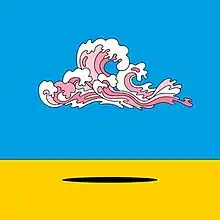Ani Couni Chaouani
"Ani Couni Chaouani" (Arapaho: Ani’qu ne’chawu’nani) is a traditional Native American hymn and song originating from the Arapaho tribes living on the plains of Colorado and Wyoming in the United States.
Description
The hymn was formerly believed to have originated from the Iroquois Nation of the Northeast.[1] However, a researcher associated with Radio-Canada discovered in 2017 that the hymn had originated from the centre of the United States,[2] more specifically from the Arapaho tribes in Colorado and Wyoming.
The hymn is sung on a plaintive tone, with dancers to the hymn often crying and thinking about their condition of dependence.[1]
Lyrics
| Original | Translation |
|---|---|
Ani’qu ne’chawu’nani’, |
Father, have mercy on me, |
Music
According to the Fourteenth annual report of the Bureau of ethnology to the secretary of the Smithsonian institution (1896), the hymn is transcribed in suit with the following notes from the original tribal version in Arapaho:[1]
![\new Staff \with {
midiInstrument = "flute"
}
{
\relative c' {
\tempo "Moderato"
\key d \minor
\time 7/4
f8[( g8]) a4 a8[ g8] f4 a8.[( f16]) f8[( d8]) d4
f8[( g8]) a4 a8[ g8] f4 a8.[( f16]) f8[( d8]) d4
%
\newSpacingSection
\time 4/4
g4 g4 g4 a8.[ f16]
d4 f8[( d8]) d4 d4
g4 g4 g4 a8.[ f16]
d4 f8[( d8]) d4 d4
%
\newSpacingSection
\time 3/4
d8[ e8]
f8[( d8]) f4 g4
f8[( d8]) d4 d8[ e8]
f8[( d8]) f4 g4
f8[( d8]) d4
\bar "|."
}
}
\addlyrics {
\lyricmode {
A -- ni’ -- qu ne’ -- cha -- wu’ -- na -- ni’,
A -- ni’ -- qu ne’ -- cha -- wu’ -- na -- ni’;
A -- wa’ -- wa bi -- qā -- na’ -- ka -- ye’ -- na,
A -- wa’ -- wa bi -- qā -- na’ -- ka -- ye’ -- na;
I -- ya -- hu’h ni’ -- bi -- thi’ -- ti,
I -- ya -- hu’h ni’ -- bi -- thi’ -- ti.
}
}
\midi {
\context {
\Score
tempoWholesPerMinute = #(ly:make-moment 90 4)
}
}](../I/eac4af0cd9517e12d39f48ae6c8c7659.png.webp)
Covers and adaptations
Many artists have covered the song in various years including notably Madeleine Chartrand in 1973.[3]
Natasha St-Pier covered it in her 2015 album Mon Acadie.
Polo & Pan version
| "Ani Kuni" | ||||
|---|---|---|---|---|
 | ||||
| Single by Polo & Pan | ||||
| from the album Cyclorama | ||||
| Released | 7 May 2021 | |||
| Recorded | 2021 | |||
| Genre | Ethnic music, fusion music | |||
| Label | Hamburger Records, Ekler'O'Shock, Virgin Records (France) | |||
| Songwriter(s) | Arapaho traditional tune | |||
| Polo & Pan singles chronology | ||||
| ||||
| Music video | ||||
| "Ani Kuni" on YouTube | ||||
In 2021, the French musical duo Polo & Pan made an adaptation of the song under the amended title "Ani Kuni" on their 2021 second album, Cyclorama.
- Charts
| Chart (2021) | Peak position |
|---|---|
| Belgium (Ultratop 50 Wallonia)[4] | 6 |
| France (SNEP)[5] | 9 |
In 2022 the Brazilian and Canadian artist Batone released his version of this song in a single recorded live in the middle of nature and during a strong storm in the rural region of Piracaia, Sāo Paulo, Brazil.
References
- Powel 1896
- "The story behind "Ani Kuni"". Canadian Broadcasting Corporation. 2017-04-02. Archived from the original on 15 December 2017.
- Discogs; Ani-Kuni / Ca tourne en rond
- "Polo & Pan – Ani kuni" (in French). Ultratop 50. Retrieved 28 August 2021.
- "Polo & Pan – Ani kuni" (in French). Les classement single. Retrieved 28 August 2021.
Bibliography
- Powel, J. W. (1896). Fourteenth annual report of the Bureau of ethnology to the secretary of the Smithsonian institution. Washington: Government printing office. p. 977.